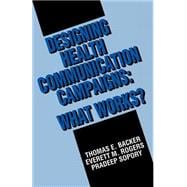
Note: Supplemental materials are not guaranteed with Rental or Used book purchases.
Purchase Benefits
What is included with this book?
| Introduction | |
| PART ONE: OVERVIEW | |
| The Challenge of Health Behavior Change | |
| One Solution | |
| Health Communication Campaigns | |
| Two Examples of Health Communication Campaigns | |
| The Comparative Synthesis Study | |
| Substance Abuse and High-Risk Youth | |
| Setting the Agenda for the Issue of Drugs | |
| PART TWO: GENERALIZATIONS ABOUT HEALTH COMMUNICATION CAMPAIGNS | |
| Overview | |
| Generalizations about Health Communication Campaigns | |
| Discussion | |
| PART THREE: INTERVIEWS WITH CAMPAIGN DESIGNERS//EXPERTS - Elaine Bratic Arkin | |
| Georgetown University - Warren J Ashley | |
| Entertainment Industry Coalition on AIDS - Charles Atkin | |
| Michigan State University - Thomas E Backer | |
| Human Interaction Research Institute - Edwin Chen | |
| Los Angeles Times - Patrick C Coleman | |
| Johns Hopkins University - Larry Deutchman | |
| Entertainment Industries Council - Brian Dyak | |
| Entertainment Industries Council - Fern Field | |
| Brookfield Productions - Juan M Flaviar | |
| International Institute of Rural Reconstruction, Philippines - Brian Flay | |
| University of Illinois - June Flora | |
| Stanford University - Vicki Freimuth | |
| University of Maryland - Kipling J Gallion | |
| The University of Texas at Austin - Robert W Gillespie | |
| Population Communications - Robert Hornik | |
| University of Pennsylvania - Jose Ruben Jara | |
| Institute for Communication Research - C Anderson Johnson | |
| University of Southern California - Marcy Kelly | |
| Mediascope - Lawrence Kincaid | |
| Johns Hopkins University - David McCallum | |
| Center for Risk Communication - Jacqueline E McDonald | |
| Scott Newman Center - John V Pavlick | |
| Freedom Forum Media Studies Center - Mary Ann Pentz | |
| University of Southern California - Ronald E Rice | |
| Rutgers University - Everett M Rogers | |
| University of Southern California - Charles Salmon | |
| University of Wisconsin - Madison - Larry Stewart | |
| Entertainment Industries Council - Lawrence Wallack | |
| University of California at Berkeley | |
| PART FOUR: IMPLICATIONS AND FUTURE DIRECTIONS | |
| Implications for Campaign Design | |
| Implications for Future Research |
The New copy of this book will include any supplemental materials advertised. Please check the title of the book to determine if it should include any access cards, study guides, lab manuals, CDs, etc.
The Used, Rental and eBook copies of this book are not guaranteed to include any supplemental materials. Typically, only the book itself is included. This is true even if the title states it includes any access cards, study guides, lab manuals, CDs, etc.